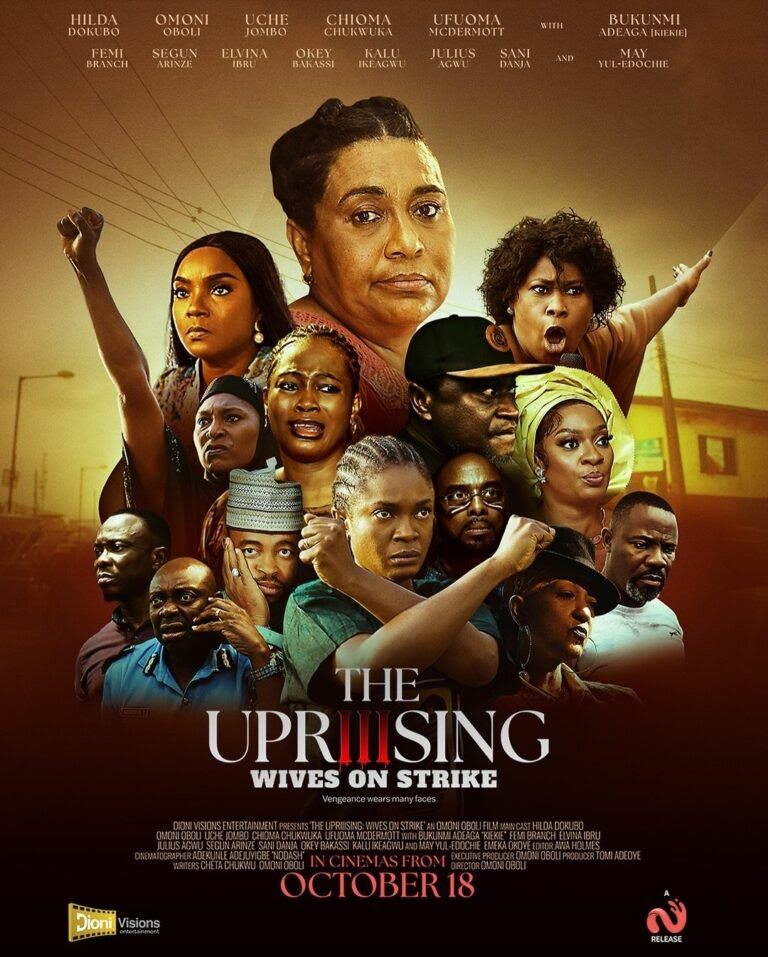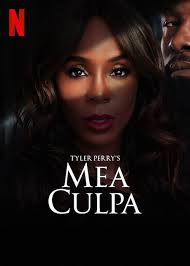Movie: The Uprising: Wives on Strike
Director: Omoni Oboli
Producers: Tomi Adeoye, Omoni Oboli
Genre: Drama, Comedy
Country: Nigeria
Language: English
Cast: Bukunmi Adeaga-Ilori, Chioma Chukwuka Akpotha, Segun Arinze, Okey Bakassi, Femi Branch, Sani Danja, Hilda Dokubo, Elvina Ibru, Kalu Ikeagwu, Uche Jombo, Ufuoma McDermott, Omoni Oboli, Tomiwa Tegbe, May Yul-Edochie
Release Date: October 18, 2024
The Uprising: Wives on Strike is a 2024 Nollywood movie directed by Omoni Oboli, the mastermind behind the original Wives on Strike series. This sequel continues the tradition of blending humor with social commentary, diving into the complexities of gender inequality, domestic struggles, and collective activism in contemporary Nigeria.
The film is both a satirical look at serious issues and an empowering story of women’s resilience and unity.
Plot Summary
The story follows a group of women who, frustrated with their husbands’ negligence and society’s patriarchy, organize a “strike” to demand better treatment and acknowledgment of their rights. The film takes their protest to the next level—escalating from home disputes to a national uprising.
Alongside the laughter-inducing antics, it delves into themes like gender-based violence, child marriage, and political corruption. The women face challenges not only from their spouses but also from societal pressures and systemic obstacles, making their journey both inspiring and relatable.

Performances
The cast delivers outstanding performances. Omoni Oboli reprises her role with charm and conviction, leading a diverse ensemble of talented actresses. Chioma Akpotha, Ufuoma McDermott, and Uche Jombo bring a mix of humor and depth to their roles, balancing the comedic moments with emotional gravitas. Their chemistry as a united front of wives is the heart of the movie.
The male characters, though secondary, are portrayed with enough nuance to highlight the deeply ingrained societal norms the film seeks to critique.
Strength
Empowering Women Through Collective Action
One of the most commendable aspects of The Uprising: Wives on Strike is its strong feminist narrative. The movie portrays women as more than just passive characters in a patriarchal society—they are change agents, united by a common goal.
By refusing to remain silent in the face of oppression, the women embody resilience and determination, which inspires audiences to think about the power of collective action.

This message is especially significant in the Nigerian cultural context, where gender inequality is often normalized. The film’s ability to address serious issues like domestic violence, child marriage, and societal expectations in a relatable and accessible way makes it a groundbreaking piece of social commentary.
It encourages women to challenge traditional norms and advocate for their rights, promoting the idea that strength lies in solidarity.
Seamless Blend of Humor and Seriousness
Another positive aspect is the film’s masterful balance between humor and serious social issues. While the core message of gender equality is crucial, The Uprising: Wives on Strike delivers it with a comedic flair that keeps the audience entertained.
The witty dialogue, hilarious situations, and vibrant characters provide moments of levity that make the heavy themes easier to digest. This comedic element not only makes the movie enjoyable but also ensures that the important topics resonate with a wider audience.

Humor becomes a tool to engage viewers, spark conversations, and make the narrative more impactful without overwhelming the audience with the weight of its themes. The blend of lighthearted moments and thought-provoking content reflects Nollywood’s ability to innovate in storytelling.
Rich Cultural Representation and Stellar Performances
The film also excels in showcasing the richness of Nigerian culture. From its use of Pidgin English and local dialects to the vibrant costumes and settings, The Uprising: Wives on Strike immerses viewers in the authenticity of its environment. This cultural representation not only adds depth to the story but also strengthens its relatability for Nigerian and African audiences.
Additionally, the ensemble cast delivers remarkable performances, bringing authenticity and charisma to their roles. Omoni Oboli, Chioma Akpotha, and Uche Jombo stand out for their seamless ability to switch between comedy and drama, making their characters relatable and compelling.
Their portrayal of women navigating personal struggles and societal challenges adds an emotional layer to the film, solidifying its impact as both an entertaining and socially relevant piece of cinema.
Weakness
While The Uprising: Wives on Strike excels in delivering a socially conscious message, it suffers from a few notable shortcomings that weaken its overall impact. The most glaring issue lies in its pacing and narrative structure.

At times, the story feels unnecessarily dragged out with repetitive scenes and subplots that add little value to the main storyline. The first half, in particular, spends too much time establishing conflicts, which slows down the momentum.
This pacing problem makes the movie feel longer than necessary and could potentially frustrate viewers looking for a tighter, more engaging progression.
Additionally, while the comedic elements provide much-needed levity, they occasionally overshadow the gravity of the issues being addressed, diluting the film’s message. This imbalance creates a tonal inconsistency that may leave some viewers questioning the seriousness of its advocacy.
Another significant drawback is the lack of depth in certain characters, particularly the male roles. While the movie seeks to critique patriarchy and societal norms, many of the male characters are reduced to one-dimensional caricatures, failing to offer a nuanced perspective on the issues at hand.
This oversimplification undermines the film’s potential to engage audiences in a more balanced dialogue about gender dynamics. Furthermore, some of the dialogue, although witty, leans heavily on clichés, which can make parts of the movie feel predictable and formulaic.

The ending, while uplifting, comes across as overly idealistic, offering a resolution that feels too neatly tied up given the complexity of the issues presented. These shortcomings, while not detracting entirely from the film’s message, limit its ability to deliver a fully compelling and impactful narrative.
Cinematography and Music
The cinematography captures Nigeria’s vibrant culture and settings, from bustling markets to quiet homes. The soundtrack features a mix of Afrobeat and traditional Nigerian music, perfectly complementing the film’s themes and mood.
Conclusion
The Uprising: Wives on Strike is an engaging blend of comedy, drama, and activism that offers more than just entertainment. It challenges societal norms while celebrating the power of collective action. Despite minor flaws, it’s a must-watch for anyone interested in stories of empowerment and social change.

Rating: 8/10
This sequel solidifies the *Wives on Strike* franchise as one of Nollywood’s best platforms for socially conscious storytelling.










